How close is the relationship between these two OOP languages?
Wednesday 2 May 2007
Recently I blogged a few thoughts on the attractions of Ruby to programmers who are more familiar with languages of the Pascal family (principally, these days, that means Delphi). I promised I’d have something to say about Ruby in comparison to C# and Smalltalk at a later date. The date is now later and the time has now come... 
Why is Microsoft so keen on Python and Ruby anyhow...?
Tuesday 1 May 2007
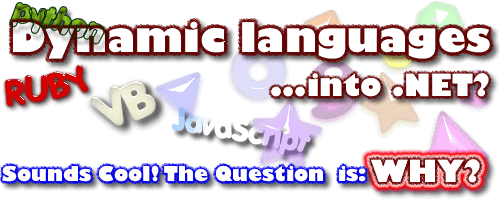
Microsoft has suddenly ‘seen the future’ - and it’s dynamic.
You know, as in ‘dynamic languages’...? “Oh, those!” you might say. What’s so futuristic about those? They’ve been around since Methuselah was just a lad.
Fun With Google...
Friday 20 April 2007
Google Maps is a fab new thing. A sort of super route-finder, it can give you directions from just about anywhere to just about anywhere. But I’d suggest you don’t take its advice literally!
Tuesday 17 April 2007
Tuesday 17 April 2007
Modularity, where art thou?
Monday 16 April 2007
For some reason, I’ve been thinking about Modula-2 quite a bit lately. Years ago, I used to program in TopSpeed Modula-2, which was created by one of Borland’s founders, Niels Jensen, and a team of ex-Borland programmers. It was a great product for its day (the early ‘90s) and, in my view, it deserved to be a massive success. The fact that it wasn’t can be attributed, largely, I think, to the dominance of C and the emergence of C++ as the PC programming language of choice at that time. Besides which, I guess Modula was just a bit too close to Pascal, and Borland had that market all wrapped up.
Is Ruby the new Pascal...?
Sunday 15 April 2007
The Beauties and Beasts of Object Orientation
Thursday 12 April 2007
Why are people with a Pascal background so often attracted to Ruby? On the face of it, Ruby and Pascal could hardly be more different. The one (Pascal) is a compiled language that strictly enforces type-checking and isn’t even object oriented. The other (Ruby) is an interpreted language with a free-and-easy approach to types (not only are there no declarations but a variable can be instantiated to totally different types of object from one line to the next) and, moreover, it’s object oriented from the ground up.
Interview with Jeff Hobbs of ActiveState Software
Saturday 7 April 2007
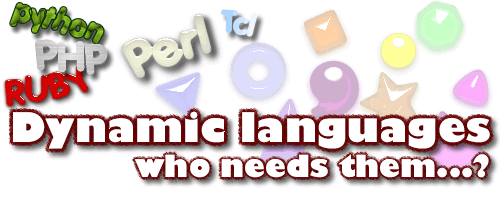 Get two dynamic language developers together and what do they talk about? Yup, you guessed it, dynamic languages. Here Huw Collingbourne (who, when not editing Bitwise, is Technology Director of SapphireSteel Software, creators of the Ruby In Steel IDE for Visual Studio), talks to Jeff Hobbs (language lead at ActiveState Software, creators of the cross-platform Komodo IDE).
Get two dynamic language developers together and what do they talk about? Yup, you guessed it, dynamic languages. Here Huw Collingbourne (who, when not editing Bitwise, is Technology Director of SapphireSteel Software, creators of the Ruby In Steel IDE for Visual Studio), talks to Jeff Hobbs (language lead at ActiveState Software, creators of the cross-platform Komodo IDE).
Can Ruby succeed where other languages have failed…?
Sunday 1 April 2007
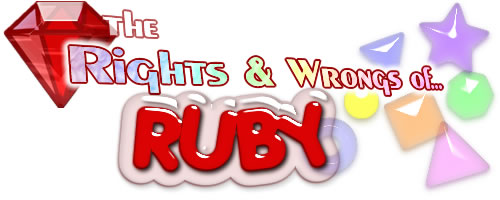
Last month Matthew Huntbach took a sceptical look at the Ruby phenomenon which caused anger and outrage among many dedicated Ruby programmers. Undaunted, Huntbach says that only time will tell if Ruby is capable of realising its full potential…
Review: Alien Skin’s ’Natural Art’ PhotoShop Effects
Saturday 24 March 2007
Why does criticism of Ruby bring out the worst in people?
Monday 19 March 2007
Little did I know, when I asked Matthew Huntbach to write an assessment of the Ruby language, how much of a storm his article would provoke. Both here on Bitwise and out on the far reaches of the Internet on places such as Reddit, Ruby aficionados have been venting their spleen upon Doctor Huntbach, calling into question everything from his academic credentials to (I kid you not!) his taste in shirts.
Matthew Huntbach takes a long hard look at the coolest language on the planet and is distinctly under impressed by what he sees…
Friday 16 March 2007

Tim Sweeney’s talk The Next Mainstream Programming Language (PowerPoint PPT)
is in many ways an antidote to the recent Ruby hype. Tim calls for the use of stronger types to ensure program reliability. He praises the academically-developed Haskell functional programming language. He raises concurrency as a feature which must be tackled in the next big programming language, using a better model than the shared state with threads and mutual exclusion devices used by Java - and by Ruby - which haven’t changed since the 1960s.
The end of the line for the MS Java-clone
Thursday 15 March 2007
J# died quietly in its sleep following a long illness - and nobody even noticed...
Multi-platform IDE for dynamic languages
Monday 12 March 2007
Komodo IDE 4.0 $295
ActiveState http://www.activestate.com/
Runs on Mac OSX 10.3; Linux and Windows (XP/2000/Vista).
This review looks at the Windows version
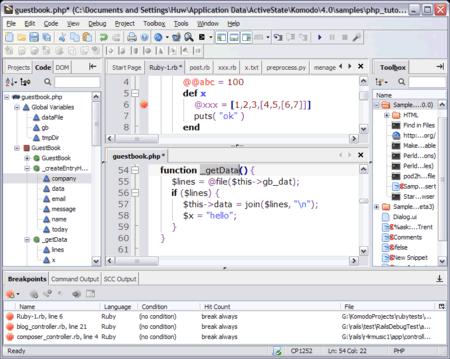
Komodo IDE 4.0
From Ada to VB
Sunday 11 March 2007
Astonishing, the stuff you can find online...
Back To The Future
Who needs an IDE anyway?
Wednesday 28 February 2007
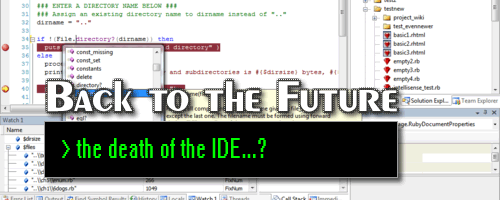
IDEs are bloated, they ‘get in the way’, they take the fun out of programming. Real programmers use a text editor and a command prompt. Go into programming forums and newsgroups scattered the length and breath of the Internet and you’ll regularly read these and similar views. It is the new orthodoxy. Just as some people would have you believe that Microsoft Windows is a passing blip on the radar, so too they would have you believe that IDEs are a momentary aberration in programming history.
What’s In A Name? Not much, apparently…
Saturday 24 February 2007
Since the announcement of CodeGear’s new ‘Delphi For PHP’, a number of longtime Delphi users have started wondering what the heck Delphi is supposed to be these days?
One name – but two products…
Tuesday 20 February 2007
CodeGear has today announced two new products bearing the Delphi name, one of which will target the Win32 platform, while the other will provide a visual development environment for PHP.
...the YouTube challenge to the might of the BBC
Sunday 18 February 2007
Bizarre at it may seem to non-Brits, one of the most popular comedy catch phases in the UK is: “I’m the only gay in the village.”

The wonderful Matt Lucas (right) - no longer the only gay in the village...
More..
|
|
|
|
|
|
360
|
|
|
|